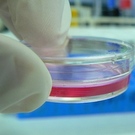
One of The Myeloma Beacon's most popular news stories of 2011 reported on an important new development in the use of gene therapy to treat blood cancers.
In particular, the article described promising results from a small study using gene therapy to treat patients who have chronic lymphocytic leukemia (CLL), and it looked at how those results might translate into new therapies for multiple myeloma (see related Beacon news).
Since the results of the CLL study were …
Read the full story »

Results of a recent Spanish study suggest that elderly multiple myeloma patients who receive Velcade plus thalidomide or Velcade plus prednisone as maintenance therapy achieve deeper responses following initial therapy with Velcade-based treatment regimens.
In addition, elderly myeloma patients who receive Velcade plus thalidomide as maintenance therapy may achieve better treatment outcomes and longer survival rates than patients who receive Velcade plus prednisone as maintenance therapy.
“In our trial, VT [Velcade plus thalidomide] was slightly superior to VP [Velcade plus …
Read the full story »

Results of a recent, small German study show that donor stem cell transplantation followed by Revlimid maintenance therapy may be feasible in heavily pretreated relapsed or refractory multiple myeloma patients.
“For younger and fit patients, [donor] stem cell transplantation followed by maintenance therapy with [Revlimid] is a reasonable treatment option for patients who have already relapsed [after an autologous stem cell transplant],” said Dr. Nicolaus Kröger of the University Hospital Hamburg-Eppendorf in Germany and lead investigator of the study.
Dr. …
Read the full story »

Dr. Michel Attal from the Purpan Hospital in Toulouse, France, presented a review of current maintenance therapies for multiple myeloma during the American Society of Clinical Oncology (ASCO) annual meeting last month.
The focus of Dr. Attal’s presentation was on whether there is evidence to support the use of the novel anti-myeloma agents thalidomide (Thalomid), Revlimid (lenalidomide), and Velcade (bortezomib) as maintenance therapy after initial therapy and stem cell transplantation.
Maintenance therapy refers to a prolonged, and …
Read the full story »

Results of a recent Phase 3 study suggest that preventative treatment with certain oral antibiotics does not significantly decrease the rate of bacterial infections among newly diagnosed multiple myeloma patients receiving initial treatment.
In the study, myeloma patients who received prophylactic (preventative) antibiotics during the first two months of chemotherapy experienced statistically similar rates of infections during those two months and for up to two years following chemotherapy as patients who did not receive antibiotics.
“Unfortunately, prophylactic antibiotics did not …
Read the full story »

Follow-up results from a long-term study conducted in Italy indicate that quality of response may be the most significant predictor of long-term survival in newly diagnosed multiple myeloma patients receiving a stem cell transplant.
The results also showed that hemoglobin levels and platelet counts at diagnosis were independent factors predicting for long-term survival.
“[This study] confirms the importance of achieving high-quality responses not only as a surrogate marker of progression-free survival and overall survival but also for long-term overall survival,” …
Read the full story »

Pomalidomide continues to show promise as a treatment for relapsed or refractory multiple myeloma patients, according to updated results from two recent Phase 2 clinical trials.
Findings from the two trials were presented at the American Society of Clinical Oncology (ASCO) annual meeting in Chicago earlier this month.
“Pomalidomide has been tested in multiple clinical trials … and responses were between 30 percent to up to 65 percent when patients had one to three prior lines of therapy. Most interestingly, …
Read the full story »

